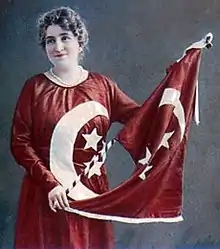Safiya Zaghloul
Safiya Zaghloul (née Fahmy; Arabic: صفية زغلول; 1878–12 January 1946) was an Egyptian political activist. She was among the early leaders of the Wafd Party.
Safiya Zaghloul صفية زغلول | |
|---|---|
 | |
| Born | Safiya Fahmy 1876 |
| Died | January 12, 1946 (aged 69–70) |
| Nationality | Egyptian |
| Spouse(s) | Saad Zaghloul |
| Parent(s) | Mustafa Fahmi Pasha (father) |
Background
Zaghloul was born in 1878. Her father, Mostafa Fahmy Pasha, of Turkish origin, was the seventh prime minister of Egypt.[1]
She married Saad Zaghloul in 1896,[2] an Egyptian revolutionary and Prime Minister of Egypt from 26 January 1924 to 24 November 1924.[3]
Activities
After the exile of her husband Saad Zaghloul to the Seychelles[4] in 1919, she became a central figure of the Wafd Party, and her home a center for the party. She organized a demonstration of 500 women. After the death of her spouse in 1927, Zaghloul was central in the appointment of a new party leader. In fact, she was the leader of the Women's Wafd.[5] She retired from political life after the party split of 1937.
She was known as Umm al-Misriyyin (The Mother of the Egyptians) and her home in Cairo was called as Beit El-Umma (the House of the Nation).[6]
References
- Doss, Madiha; Helmi, Laila (2013). Nowaira, Amira; El Kholy, Azza; Ennaji, Moha (eds.). Des femmes écrivent l'Afrique: L'Afrique du Nord (in French). Karthala Editions. p. 434. ISBN 978-2-8111-0731-4.
- Albert Hourani (1962). Arabic Thought in the Liberal Age, 1798-1939. London: Oxford University Press. Retrieved 25 December 2013. – via Questia (subscription required)
- Steven A. Cook (1 September 2011). The Struggle for Egypt: From Nasser to Tahrir Square. Oxford University Press. p. 32. ISBN 978-0-19-979532-1. Retrieved 11 September 2013.
- "This day in history: Mother of Egyptians Safeya Zaghloul dies in 1946 - Egypt Independent". Egypt Independent. 12 January 2014. Retrieved 15 November 2017.
- "Women in power". Women leaders guide. Retrieved 11 September 2013.
- Nabila Ramdani (2013). "Women in the 1919 Egyptian Revolution: From Feminist Awakening to Nationalist Political Activism". Journal of International Women's Studies. 14 (2): 39–52. Retrieved 28 October 2013.